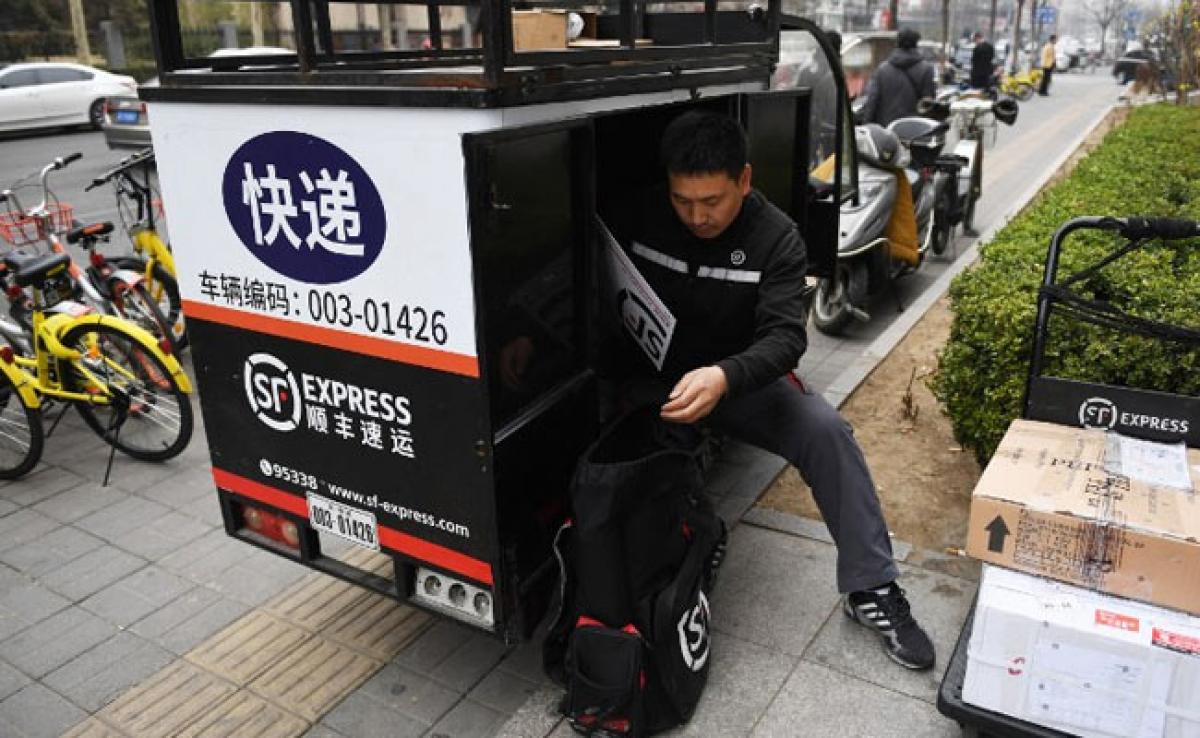Live
- Bengal: Senior resident doctor accused of rape, attempt to murder absconding
- Prateeksha Srivastava says she seldom meets fellow music composers Rusha, Blizza, in person
- KTR Accuses Government of Brutality Against Farmers, Calls for Immediate Action
- Manchu Manoj Attends Shooting Amid Family Controversy
- BWF World Tour Finals: Treesa-Gayatri defeat Malaysian pair to keep semis hopes alive
- MUDA case: Complainant Krishna asks Lokayukta to file new plaint on CM Siddaramaiah on ED’s report
- Airport capex in India to cross Rs 60,000 cr in fiscals 2025-2027 to handle growing traffic: Crisil
- Five-Year-Old Boy Dies After 55-Hour Rescue from Borewell in Rajasthan's Dausa
- Chaos in Parliament over Congress-George Soros link claims, BJP MP poses questions
- Bus Driver Arrested After Deadly Accident in Mumbai’s Kurla; 42 Injured
Just In

From making illegal cross-border deliveries to China in a minivan to buying a fleet of Boeing aircraft, the boss of SF Express has ridden a wave of online shopping to become one of the country\'s richest men.
From making illegal cross-border deliveries to China in a minivan to buying a fleet of Boeing aircraft, the boss of SF Express has ridden a wave of online shopping to become one of the country's richest men.
Though secretive and media-shy, founder Wang Wei has found himself thrust into the spotlight after the listing of his SF Express courier service on the Shenzhen stock exchange made him a billionaire twenty times over.
He is now the fourth wealthiest man in China, according to Bloomberg's Billionaires Index, with $23.3 billion on March 29, just behind Pony Ma, founder of internet giant Tencent.
A maverick who boasted in his only public interview that the business began as a "black" -- or illegal -- delivery service, the 46-year-old has built his company into the top courier in China's booming and cutthroat e-commerce market.
While he stubbornly avoids the media, his SF Express is now inescapable, with an 80,000-strong staff -- using three-dozen aircraft and thousands of vehicles -- delivering throughout China's huge cities.
Wang, the son of a Chinese army interpreter and raised in Hong Kong, launched SF Express in 1993 as a way to shuttle packages across the border between the then-British colony and the Communist-ruled mainland.
It was a risky but lucrative job carried out by a handful of employees in a minivan.
"When SF started delivering packages in the 1990s, it was still an illegal business called 'black delivery'," Wang said in a 2011 interview with the Communist Party mouthpiece People's Daily. At the time, China's postal service enjoyed a monopoly over deliveries.
"We would be fined if caught by postal officers, so we had to handle packages sneakily."
Bet that paid off
His business grew on the back of so-called "parallel trading", where shoppers buy goods such as baby formula and medicines in Hong Kong and smuggle them to China for sale with a hefty markup.
In 2005, he reportedly staked the company as collateral for a half-a-million-dollar loan, according to Hong Kong's Next magazine.
It was a bet that paid off.
Today, SF Express is the nation's largest parcel delivery company by revenue -- with sales of $7.4 billion in 2015, according to Bloomberg -- riding a booming domestic e-commerce industry that is led by Alibaba.
Wang realised his dream of joining the stock exchange after navigating a so-called "backdoor listing" this year, which allowed it to skip a waiting list of 700 firms looking to launch initial public offerings.
He was given a government green light for a complex transaction that allowed it to merge with a small rare earths company already listed in Shenzhen, then taking its place.
The transaction was finalised on February 24, when SF Holding replaced Maanshan Dingtai's shares. Its price ballooned about 70 percent in eight sessions, massively inflating Wang's fortunes.
Eye on air freight
Analyst Xu Yong told AFP the surge was no surprise, as "sales reflect the general confidence" in the business prospects of SF Express, which saw profits rise 112 percent last year.
For SF Express, the listing is crucial to finance infrastructure investments that could make Wang richer yet, particularly in smaller cities and air freight, Xu added.
The group is also constructing a cargo airport in the central province of Hubei.
China's express delivery industry is the largest in the world, with sales reaching 4 trillion yuan last year, representing more than 40 percent of global business in the industry, according to data from the country's postal service.
Wang's elusiveness has driven both media and investors to unusual lengths to learn about him and his company's operations.
Hong Kong's Next magazine sent a reporter to work undercover as a deliveryman at SF Express for three months in 2010, and private equity investors reportedly offered a 500,000 yuan bounty to anyone who could arrange a dinner with him.
But as the company has grown, it has become more difficult for Wang to avoid the spotlight.
In 2010, he found himself in the papers when he spent a then-record HK$350 million ($45 million) on land in Hong Kong, where he built a luxury four-storey trophy home.

© 2024 Hyderabad Media House Limited/The Hans India. All rights reserved. Powered by hocalwire.com







